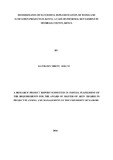| dc.description.abstract | This study aimed at examining the factors influencing the implementation of sustainable water and sanitation projects in Kenya: a case of informal settlement in Mombasa County, and was guided by the following objectives: To find out the influence of financial resources on the implementation of sustainable water and sanitation projects in informal settlements; To examine the influence of monitoring and evaluation on the implementation of sustainable water and sanitation projects in informal settlements; To examine the influence of politics on the implementation of sustainable water and sanitation projects in informal settlements; and, To establish the extent to which rate of returns influence the implementation of sustainable water and sanitation projects in informal settlements. The research design adopted for this study was a descriptive survey design. Target population was 436 respondents. The sampling size was calculated using the table below by Krejcie& Morgan (1970) to determine the sample size of 205.From the results, over 95% of the employees of MOWASCO felt that financial resources are closely linked to the supply of water to the slums and the implementation of the WS projects in areas like Likoni, Kisauni, Kisumu Ndogo, Bangladeshi/Uhuru Owinyo and many more. This was however overtaken by the issue of rates of returns whereby over 97.5% of the respondents felt that the theft cases, illegal connections, unpaid bills etc. have kept various companies and organizations away from applying for licenses to offer WSS to the people in the slums. Politics scored an average influence since the politicians formulate rules, policies, control resources, allocate resources, mobilize resources and influence the people they lead. This was followed by M&E that seemed not to be welcomed with the respondents. Based on the findings of the study, the researcher recommended that: there should be sufficient funds allocated to the projects by the donors, national government, county government and other stakeholders; there should be an integrated M&E process with set policies and regulations to take care of the whole process of the implementation of WS projects; the politicians to have a positive perception about the slum dwellers and give them priorities in passing laws, allocating finances and allocating major projects o these areas that aim at addressing the WS issue; and finally the researcher recommends that, the companies operating in providing the WSS in the slums should not only focus on the profits they make but also should consider the welfare of the locals. | en_US |



